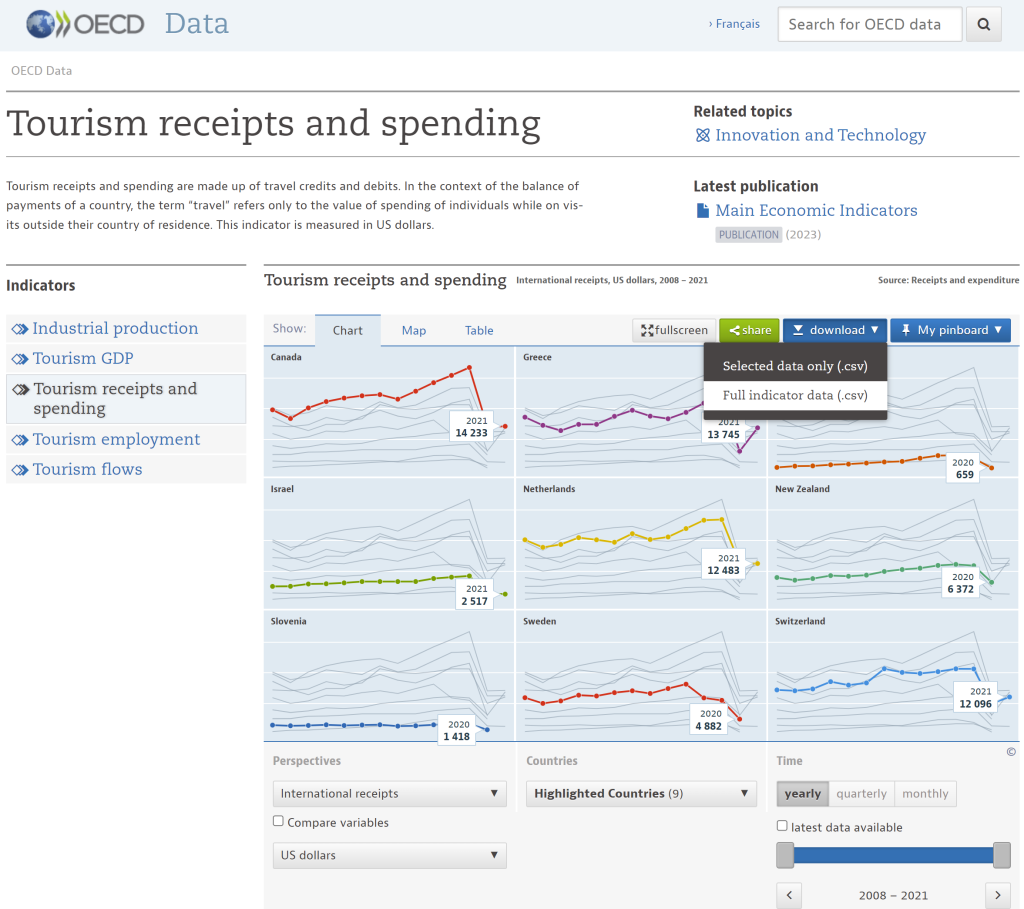22 PivotTables & PivotCharts with OECD International Tourism Data
 This chapter is in collaboration with Professor Mary Sykes from the Department of Accountancy and Taxation at the C.T. Bauer College of Business. Prof. Sykes holds an MBA and is a licensed CPA in the state of Texas. Her teaching areas include financial, managerial, and international accounting; accounting ethics, and oil & gas accounting.
This chapter is in collaboration with Professor Mary Sykes from the Department of Accountancy and Taxation at the C.T. Bauer College of Business. Prof. Sykes holds an MBA and is a licensed CPA in the state of Texas. Her teaching areas include financial, managerial, and international accounting; accounting ethics, and oil & gas accounting.
The tourism economy is an essential component of the service economy. Prior to the COVID pandemic, this was a thriving industry that contributed 4.4% of GDP, 6.9% of employment and 20.5% of service-related exports. During the pandemic, international tourism also came to a halt and GDP fell significantly. In 2022, as a result of pent-up demand, tourism rebounded sharply. However, the recovery of this industry remains somewhat fragile across counties. Geopolitical pressures, inflation, and a host of other issues impact this industry (OECD, 2022).
Accounting Positions @ Hotels
The various types of positions found at hotels vary depending on the size and financial position of the hotel. A large established chain of hotels would likely employ accountants that specialize in handling various accounting functions, such as revenue, payroll, accounts receivable/payroll, financial controller and other. However, a smaller hotel chain with less financial resources could consolidate many of the more specialized functions. For example, a general hotel accountant, an internal auditor and a general ledger accountant could handle those functions. The hotel management could contract with an external specialist when needed. This would be generally less costly.
Why do non-business majors need Accounting?
Accounting is the language of business and is an important aspect of everyone’s life. Practically every day we are confronted with making a business decision. Do I buy that coffee or book on the way to work or school? Can I afford to go on a trip? Which hotel is best suited for my needs and budget?
Throughout one’s life we will be faced with making significant financial decisions. Below are just a few:
- Choosing a bank and saving up for your travels
- Evaluating payment options for larger purchases
- Budgeting for a larger purchase or a trip
Understanding the language of business will help everyone understand and interpret financial information. It will provide an understanding of basic accounting terminology, such as: Assets, Liabilities, Revenue, Expense, Net Income.
OECD Tourism Trends and policies report
We will be working with data from the OECD. To learn more about the context, consider reading this report.
Read highlights from the report:
View the video
The Data Set
The OECD Data explorer offers a variety of data for us to practice with. Go to Tourism receipts and spending. Observe the line charts that are displayed and you can immediately see the impact of COVID-19. Download the Full indicator data (.csv) file. Open Excel, locate the csv file, open it, then save it as an .xlsx file.

DATA ANALYSIS WARM-UP QUESTIONS:
- What kinds of data do you expect to find in the file you downloaded?
- Open the data file. Is there a summary of info sheet?
- Is there a Data Dictionary? If it’s not included in the data file, where can you locate it?
- Do the field names make sense? What can you do if there is no data dictionary to be found?
- How much data is in the workbook: how many fields, records, cells with contents are there?
- What types of questions can you answer with the data?
- What functions do you know in Excel that will help you process data?


